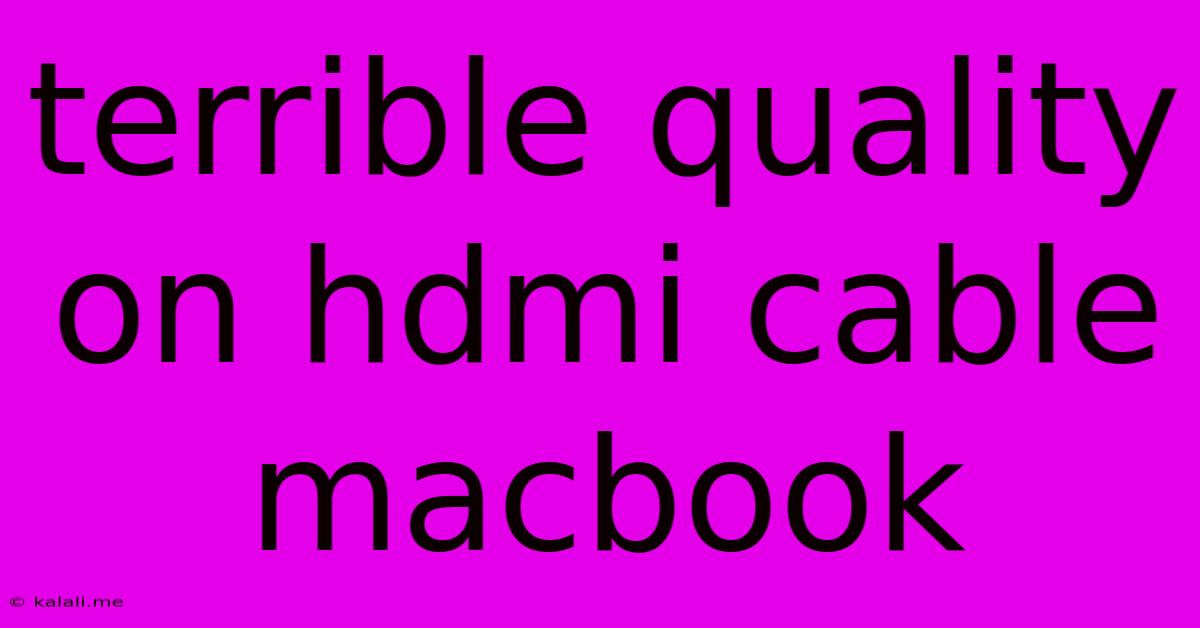Terrible Quality On Hdmi Cable Macbook
Kalali
Jun 07, 2025 · 3 min read

Table of Contents
Terrible Quality on HDMI Cable: Troubleshooting Your MacBook's Display Issues
Are you experiencing frustratingly poor video quality when connecting your MacBook to an external display via HDMI? Blurry images, flickering screens, and distorted colors can seriously hamper productivity. This article will guide you through troubleshooting common causes of terrible quality on HDMI cables connected to your MacBook, helping you pinpoint the problem and restore crisp, clear visuals. We'll cover everything from simple checks to more advanced solutions.
Understanding the Problem: Why is my HDMI Output Poor?
The issue of poor HDMI quality on your MacBook can stem from several sources. It's rarely a single, easily identifiable culprit. The problem could lie within the HDMI cable itself, your MacBook's output, the external display's input, or even the settings on your Mac. Let's explore these possibilities systematically.
1. The Cable Itself: The Most Common Culprit
Often, the simplest solution is also the most overlooked: the HDMI cable might be faulty. A damaged cable, even with seemingly minor external wear, can significantly degrade video quality. Check the cable for any visible signs of damage – kinks, bends, fraying, or broken connectors. Try a different, known-good HDMI cable. A high-quality, high-bandwidth cable (HDMI 2.0 or higher, depending on your needs) is recommended for optimal performance, especially with high resolutions or refresh rates. Consider the cable length; excessively long cables can sometimes introduce signal degradation.
2. MacBook Output Issues: Internal Problems
If changing the cable doesn't solve the problem, the issue might originate within your MacBook. This could involve several factors:
- Overheating: Excessive heat can affect the performance of your MacBook's internal components, including the video output. Ensure your MacBook is well-ventilated and not obstructed.
- Driver Issues: Outdated or corrupted graphics drivers can cause display problems. Check for updates in System Preferences > Software Update. If updates are available, install them and restart your MacBook.
- Software Glitches: Occasionally, software conflicts can impact display output. Try restarting your MacBook to see if this resolves the issue. Consider running Apple Diagnostics (hold D during startup) to check for any hardware problems.
3. External Display Problems: Checking the Recipient
The external display itself could be the source of the problem. Try connecting a different device (if available) to the external display via HDMI to see if the same quality issues arise. If another device displays correctly, the problem is likely with your MacBook or the connection. If the issue persists with another device, the external display may require troubleshooting or repair.
- Incorrect Input Source: Double-check that your external display is set to the correct input source (HDMI).
- Display Settings: The resolution and refresh rate settings on your MacBook and the external display should be compatible. Experiment with different settings to find an optimal configuration.
4. Resolution and Refresh Rate Mismatch
Incompatibility between your MacBook's output capabilities and the external display's capabilities can lead to poor video quality. Make sure the resolution and refresh rate settings on your MacBook match the supported specifications of your external display. You can adjust these settings in System Preferences > Displays.
5. HDMI Port Issues: A Less Common Problem
Although less frequent, a problem with your MacBook's HDMI port itself is possible. If you have another port (like Thunderbolt with an adapter), try using that.
Taking Action: Steps to Improve Your HDMI Experience
- Try different cables: This is the easiest and most effective first step.
- Update your drivers: Ensure your graphics drivers are up-to-date.
- Check your display settings: Ensure compatibility between your Mac and external display settings.
- Restart your Mac: A simple restart can often resolve temporary software glitches.
- Run Apple Diagnostics: This can help identify hardware problems.
- Check for overheating: Ensure adequate ventilation for your MacBook.
- Consider professional help: If all else fails, consult an Apple technician or a qualified computer repair specialist.
By systematically checking each of these potential causes, you'll significantly increase your chances of identifying and resolving the source of your poor HDMI video quality on your MacBook. Remember, patience and a methodical approach are key to finding a solution.
Latest Posts
Latest Posts
-
Cubic Feet Per Second To Feet Per Second
Jun 07, 2025
-
Dexter Does Way More For The Police
Jun 07, 2025
-
How To Clean Tea Stains From Cups
Jun 07, 2025
-
How Much Does A Cup Of Rice Weigh
Jun 07, 2025
-
Hpatic Feedback Trakcpad Not As Good As Mechanical
Jun 07, 2025
Related Post
Thank you for visiting our website which covers about Terrible Quality On Hdmi Cable Macbook . We hope the information provided has been useful to you. Feel free to contact us if you have any questions or need further assistance. See you next time and don't miss to bookmark.